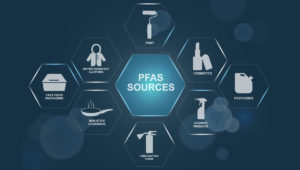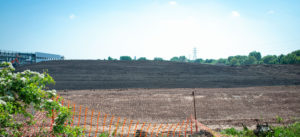Oil and chemical spills make the headlines when they’re on a massive scale. But they happen more often than you’d think on commercial and domestic land.
And all too often, these spills can end up threatening our environment, wildlife and health when they are left untreated. Many spills can lead to oil seeping into rivers and if the pollution originates from your land you face an unlimited fine and prison for up to 5 years!
Some oil and chemical spills go undetected for a while until the telltale ‘rainbow’ effect on surfaces after rainfall.
Check out the statutory government guidance when dealing with contaminated land to make sure you understand the rules if you suffer a spill.
What causes oil and chemical spills?
Around 80% of oil spills on land happen because of a failure of heavy-duty equipment or vehicles, including stored boats. More likely than not, this is due to the lack of maintenance of equipment. Of course, a lot of spills happen accidentally.
There are also problems with the illegal dumping of oil, especially in rural areas where farmland is hidden from view. The cost of dealing with old oil means some people decide to take the illegal option!
Spills on commercial land
ATG Group was called to a school in Northern Ireland after the discovery of oil seeping up through the asphalt during winter. The biggest challenge was finding the source of the spill. We discovered that the severe weather led to a kerosene tank fracturing.
As a result, 1,500 litres of kerosene was being released under the ground and the land was becoming contaminated. You can find out more about how we dealt with the problem here.
Machinery used by developers can also create problems in extreme weather that can lead to oil spills, too. And the amount of vehicles driving in and out of the site increases the chances of a spill.
Our advice to people who work in the commercial sector is to ensure you have oil spill kits on site. These kits can be used in an emergency situation to contain the spill. The quicker you act, the less damage will occur. We provide a range of spill kits here.
Domestic oil tanks
Commercial land is more likely to be the scene of oil and chemical spills, but domestic land is also at risk. In fact, earlier this summer the Environment Agency issued a warning to homeowners to check heating oil tanks.
During the summer months, tanks contain more oil than normal, which increases the risk of spills and leaks. If you fail to treat the spill, the oil will find its way into the environment and could reach the water table. Remember, you risk prosecution for ignoring a spill.
Accidents also happen, and we were called to a farmhouse in Northern Ireland after a tractor trailer clipped and punctured a 1,200-litre tank. It had recently been filled, so its entire contents poured onto the road and garden. Find out more about that incident here.
What to do if you find a leak or spill
You must act quickly if you suspect there is an oil leak on your land or at home. Failure to do so could result in prosecution.
You also need to contact your insurance company, who might appoint a specialist contractor on your behalf. This depends on your contract with your insurance company.
Spills and leaks can be contained more easily if you act quickly and there is less chance of damage to your property or wildlife and the environment. There are some useful tips here.
How to clean-up
If you contact an oil spill contractor, like us here at ATG Group, we will deal with cleaning up the soil and land that has been affected. You can clean very minor spills yourself, but if you are unsure don’t try! You could create more issues than you solve.
Anyone trained to use spill kits, should use the kit as soon as possible if there is an oil spill. You should then contact a specialist contractor like us to carry out intensive cleaning and remediation.
If you would like more information about how we deal with oil and chemical spills, please get in touch.








